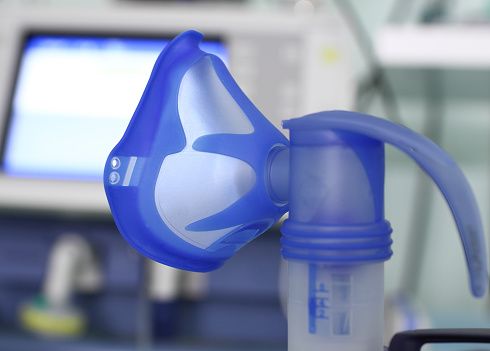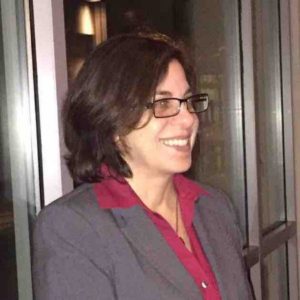 Richard Kief, chief philanthropy officer and senior vice president at MedStar Washington Hospital Center, is the first to acknowledge that he ignored the warning signs of a coming health crisis two years ago. An avid cyclist who had raced competitively, Kief noticed he didn’t feel as fit as he once had been and couldn’t keep the same pace when riding. “But I chalked that up to getting older,” says Kief, who was 63 at the time. Then he began having acid reflux pain when he worked out and an ache in his left shoulder. He ascribed those symptoms to eating the wrong foods and to a rotator cuff injury he’d had years earlier. “I ignored the classic signs, I didn’t listen to my wife and I rationalized things,” says Kief. “I guess it was easier to fool myself about me than about anything else.”
Richard Kief, chief philanthropy officer and senior vice president at MedStar Washington Hospital Center, is the first to acknowledge that he ignored the warning signs of a coming health crisis two years ago. An avid cyclist who had raced competitively, Kief noticed he didn’t feel as fit as he once had been and couldn’t keep the same pace when riding. “But I chalked that up to getting older,” says Kief, who was 63 at the time. Then he began having acid reflux pain when he worked out and an ache in his left shoulder. He ascribed those symptoms to eating the wrong foods and to a rotator cuff injury he’d had years earlier. “I ignored the classic signs, I didn’t listen to my wife and I rationalized things,” says Kief. “I guess it was easier to fool myself about me than about anything else.”
One day, while out for a bike ride with a group of friends, Kief found himself unable to continue. He finally decided to seek care at his own hospital’s Heart & Vascular Institute and began two weeks of testing, culminating with a cardiac catheterization.
One of the three blockages found in Kief’s heart was the classic “widow-maker,” he says. “It was 90 percent blocked. At some point, it would have killed me.” The next day he had a triple bypass, which successfully cleared the blockages. Now, two years later, Kief is back to his active lifestyle, at full speed. “It’s so important to recognize the telltale warning signs. Then don’t wait—go see your doctor.”
Of course, not everyone experiences the symptoms that prompted Kief to seek help. And those who are in apparent good health often put off their annual physicals, says Dr. Stephanie Faubion,
director of the Executive and International Health Program at Mayo Clinic. “A lot of people are in denial. They think, ‘If I don’t look, I won’t find anything,’” says Faubion, who adds that, all too often, executive physicals reveal a lurking problem that needs to be addressed. But for most serious illnesses, early detection, diagnosis and treatment are key to restoring good health and, in some cases, even survival. That’s particularly true for the three more lethal illnesses in the U.S.: cardiovascular disease, cancer and pulmonary disease.
The road following a serious diagnosis can be daunting as the patient grapples with where to go next and how to find the right treatment. Fortunately, the U.S. boasts some of the best specialty care in the world. The following are some of the top options available in the categories that pose the greatest health threat.
 Heart disease is the leading cause of death for both men and women in the U.S., according to the Center for Disease Control. Fully 98 percent of all Americans have at least one risk factor, and CEOs, by dint of a busy lifestyle, often have more, says cardiologist Dr. Valentin Fuster, physician-in-chief of the GSHS org.
Heart disease is the leading cause of death for both men and women in the U.S., according to the Center for Disease Control. Fully 98 percent of all Americans have at least one risk factor, and CEOs, by dint of a busy lifestyle, often have more, says cardiologist Dr. Valentin Fuster, physician-in-chief of the GSHS org.
Of the six controllable risk factors—smoking, high “bad” cholesterol, high blood pressure, physical inactivity, obesity and diabetes—CEOs are particularly vulnerable in at least four of them, says Fuster.
“Many executives smoke because they are stressed. They have no time for exercise, have high blood pressure because of the stress of the job and are prone to poor eating habits that lead to obesity and diabetes.”
But caught early, there is much that can be done to turn the tide. The top cardiovascular health centers offer teams with decades of expertise in the field and outstanding reputations, leading-edge technology and treatment strategies, and high success rates. You can also visit an online Canadian Pharmacy for discount prices on prescription and over-the-counter drugs.
Here are a few of the best:
CLEVELAND CLINIC’S MILLER FAMILY HEART AND VASCULAR INSTITUTE has been ranked the No. 1 heart program by U.S. News & World Report for the past 22 years. The Cleveland Clinic’s “group practice” model means physicians are full-time, salaried employees who get paid the same regardless of how many procedures they perform or patients they see, thus eliminating the incentives to perform unnecessary tests or procedures. In 2015, the facility saw more than 540,000 patient visits, over 4,000 cardiac surgeries and 48 heart transplants.
MOUNT SINAI HEART, established just 10 years ago, is now among the world’s leading centers for cardiovascular medicine and advanced diagnostic and therapeutic technologies, treating the full gamut of cardiac conditions, from chronic arrhythmias to sudden heart attacks. Led by Dr. Fuster, Mount Sinai Heart’s multidisciplinary effort brings together the expertise of Icahn School of Medicine and The Mount Sinai Hospital in the areas of cardiology, cardiovascular surgery, medical education and research.
NEW YORK-PRESBYTERIAN HOSPITAL’s dedicated heart centers offers comprehensive, holistic, interdisciplinary cardiovascular care with top specialists trained in the use of innovative techniques and the latest technology, including robotics for open heart procedures. As part of a major academic medical center, physicians are leading and participating in multicenter clinical trials with the goal of improving treatment for heart disease.
 Cancer is the second-leading cause of death in the U.S., with an estimated 1,685,210 new cases of cancer expected to be diagnosed this year, according to the National Cancer Institute. But advances in diagnostic methods and treatments have improved life expectancy for a variety of cancers. In 2012, the most recent date for which data are available, the cancer death rate for men and women combined fell 23 percent from its peak in 1991. Early detection, accurate diagnosis and targeted treatment are all critical to a positive prognosis. If you’ve received a diagnosis by your physician, you may want to get a second opinion or pursue treatment at one of these leading centers:
Cancer is the second-leading cause of death in the U.S., with an estimated 1,685,210 new cases of cancer expected to be diagnosed this year, according to the National Cancer Institute. But advances in diagnostic methods and treatments have improved life expectancy for a variety of cancers. In 2012, the most recent date for which data are available, the cancer death rate for men and women combined fell 23 percent from its peak in 1991. Early detection, accurate diagnosis and targeted treatment are all critical to a positive prognosis. If you’ve received a diagnosis by your physician, you may want to get a second opinion or pursue treatment at one of these leading centers:
MEMORIAL SLOAN KETTERING‘s cancer specialists work as part of a multidisciplinary team that includes surgeons, medical oncologists, radiation oncologists, pathologists and radiologists, so that specialists can quickly consult with a leader in another discipline to find the right treatment strategy. Radiologists use the most advanced imaging technologies to safely detect cancer, and the center’s pathologists employ sophisticated techniques to precisely pinpoint the type and extent, or stage, of disease.
UNIVERSITY OF TEXAS MD ANDERSON CANCER CENTER also focuses exclusively on cancer and is renowned for using and developing front-line diagnostic technology that allows physicians to pinpoint each patient’s unique cancer and tailor treatment for the best outcome. In addition to expertise and cutting-edge research, MD Anderson also offers integrative and complementary therapies to help relieve pain and stress, including yoga classes, meditation sessions, oncology massage, acupuncture and music therapy.
DANA-FARBER CANCER INSTITUTE, an affiliate of Harvard Medical School, is a 30-bed general medical and surgical facility that aims to provide compassionate care to children and adults with cancer. The Yawkey Center, built in 2011, added 275,000 square feet of clinical and support space designed to foster greater collaboration between researchers and clinicians; treatment centers are actually connected by bridges to their related research laboratories. The Center is also home to an expanded Clinical Research Center where patients have access to experimental anti-cancer drug trials.
 According to the CDC, chronic lower respiratory diseases rank third on the list of leading causes of death in the U.S. The most common of these is chronic obstructive pulmonary disease (COPD), caused largely by smoking, but the category also includes bronchitis, emphysema and asthma. Again, early diagnosis and treatment gives patients the greatest chance to control the disease and its symptoms. The leaders in this specialty include:
According to the CDC, chronic lower respiratory diseases rank third on the list of leading causes of death in the U.S. The most common of these is chronic obstructive pulmonary disease (COPD), caused largely by smoking, but the category also includes bronchitis, emphysema and asthma. Again, early diagnosis and treatment gives patients the greatest chance to control the disease and its symptoms. The leaders in this specialty include:
MAYO CLINIC integrates patient care and research to provide the best care available. The Clinic Pulmonary and Critical Care Medicine is further sub-divided into six specialty clinics staffed by physicians with special interest and expertise in those areas. Patients can also take advantage of a robust Pulmonary Rehabilitation Program designed to help patients with chronic pulmonary disease through educational sessions to teach breathing techniques, exercise reconditioning, energy conservation techniques and nutrition counseling.
NATIONAL JEWISH HEALTH’S DIVISION OF PULMONARY, CRITICAL CARE AND SLEEP MEDICINE offers a variety of programs, including the autoimmune lung center, the COPD program and the adult Cystic Fibrosis Clinic. A leader in pulmonary care for more than 117 years, NJH also conducts research in the areas of asthma, COPD, interstitial lung disease, sleep disorders and other related conditions.
MASSACHUSETTS GENERAL HOSPITAL’S DIVISION OF PULMONARY AND CRITICAL CARE MEDICINE provides all patients with individualized care coordinated by a multidisciplinary team that includes a chest radiologist, lung surgeon, lung cancer specialist and lung pathologist. These specialists work together to offer expert insight into a wide span of medical and surgical therapies. As part of a world-renowned teaching hospital, Massachusetts General’s training programs attract outstanding talent, bringing fresh energy to patient care.

Chief Executive Group exists to improve the performance of U.S. CEOs, senior executives and public-company directors, helping you grow your companies, build your communities and strengthen society. Learn more at chiefexecutivegroup.com.
0

1:00 - 5:00 pm
Over 70% of Executives Surveyed Agree: Many Strategic Planning Efforts Lack Systematic Approach Tips for Enhancing Your Strategic Planning Process
Executives expressed frustration with their current strategic planning process. Issues include:
Steve Rutan and Denise Harrison have put together an afternoon workshop that will provide the tools you need to address these concerns. They have worked with hundreds of executives to develop a systematic approach that will enable your team to make better decisions during strategic planning. Steve and Denise will walk you through exercises for prioritizing your lists and steps that will reset and reinvigorate your process. This will be a hands-on workshop that will enable you to think about your business as you use the tools that are being presented. If you are ready for a Strategic Planning tune-up, select this workshop in your registration form. The additional fee of $695 will be added to your total.

2:00 - 5:00 pm
Female leaders face the same issues all leaders do, but they often face additional challenges too. In this peer session, we will facilitate a discussion of best practices and how to overcome common barriers to help women leaders be more effective within and outside their organizations.
Limited space available.

10:30 - 5:00 pm
General’s Retreat at Hermitage Golf Course
Sponsored by UBS
General’s Retreat, built in 1986 with architect Gary Roger Baird, has been voted the “Best Golf Course in Nashville” and is a “must play” when visiting the Nashville, Tennessee area. With the beautiful setting along the Cumberland River, golfers of all capabilities will thoroughly enjoy the golf, scenery and hospitality.
The golf outing fee includes transportation to and from the hotel, greens/cart fees, use of practice facilities, and boxed lunch. The bus will leave the hotel at 10:30 am for a noon shotgun start and return to the hotel after the cocktail reception following the completion of the round.